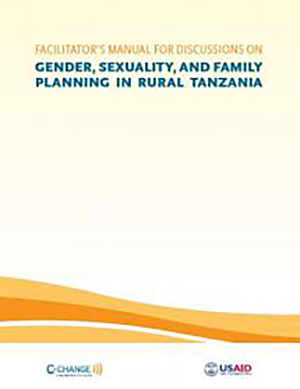
Resource Type:
Facilitator Manual
Region/Country:
Tanzania
Primary Audience:
Couples
Technical Area:
Family Planning, Sexual and Reproductive Health, Livelihoods and Economic Inclusion
SBC Approach:
Gender-Transformative Approaches; Life Skills; Small Group Sessions, Interpersonal Communication
Facilitator’s Manual for Discussions on Gender, Sexuality, and Family Planning in Rural Tanzania
This manual was designed to help facilitators lead a series of discussion exercises with young couples ages 18–35 to increase their use of modern contraception, improve couple communication about sex and family planning, and promote gender-equitable attitudes.
Access this Resource
Organization/author: FHI360
Year: 2019Language: English
Know, Care, Do Theory of Change (learn more)
Components of Engagement:
 Know Know about FP/SRH by having factual knowledge about FP/SRH services and methods and harmful gender norms and expectations.
Know Know about FP/SRH by having factual knowledge about FP/SRH services and methods and harmful gender norms and expectations. Care Care about FP/SRH by assuming responsibility for their personal health and reproduction and accountability for supporting their partners’ reproductive priorities and needs.
Care Care about FP/SRH by assuming responsibility for their personal health and reproduction and accountability for supporting their partners’ reproductive priorities and needs. Do Do supportive actions for FP/SRH by taking concrete steps to communicate and help achieve reproductive intentions and goals from themselves and in support of their partners.
Do Do supportive actions for FP/SRH by taking concrete steps to communicate and help achieve reproductive intentions and goals from themselves and in support of their partners.
Role in Engagement:
Client/UserAs clients or users of FP/SRH services with unique priorities, needs, and preferences that should be met by programs.
, PartnerAs partners in their relationships regarding FP/SRH issues and in challenging and addressing gender inequality and inequitable gender norms and roles.
, Agent of ChangeAs agents of change who actively aim to improve outcomes for themselves, their partners, their families, and their communities.

